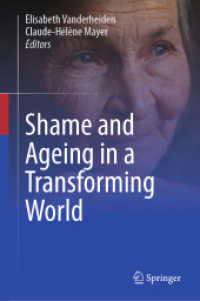- ホーム
- > 洋書
- > 英文書
- > History / World
Full Description
It is perhaps commonplace to say that India is one of the world's richest and most enticing cultures. One thousand years have passed since Albiruni, arguably the first "Indologist", wrote his outsider's account of the subcontinent and two hundred years have passed since the inception of Western Indology. And yet, what this monumental scholarship has achieved is still outweighed by the huge tracts of terra incognita: thousands of works lacking scholarly attention and even more manuscripts which still await careful study whilst decaying in the unforgiving Indian climate. In September 2009 young researchers and graduate students in this field came together to present their cutting-edge work at the first International Indology Graduate Research Symposium, which was held at Oxford University. This volume, the first in a new series which will publish the proceedings of the Symposium, will make important contributions to the study of the classical civilisation of the Indian sub-continent. The series, edited by Nina Mirnig, Péter-Dániel Szántó and Michael Williams, will strive to cover a wide range of subjects reaching from literature, religion, philosophy, ritual and grammar to social history, with the aim that the research published will not only enrich the field of classical Indology but eventually also contribute to the studies of history and anthropology of India and Indianised Central and South-East Asia.
Contents
1. Defining the Svara Bearing Unit in the siksavedanga literature: Unmasking a veiled debate. (Giovanni Ciotti)
2. Puranic transformations in Cola Cidambaram: The Cidambaramahatmya and the Sutasamhita. (Whitney Cox)
3. Unfuzzying the fuzzy. The distinction between rasas and bhavas in Bharata and Abhinavagupta. (Daniele Cunio)
4. A Contribution of Vedanta to the history of Mimamsa: Prakasatman's interpretation of "verbal effectuation" (sabdabhavana). (Hugo David)
5. Married women and courtesans: Marriage and women's room for manoeuvre as depicted in the Katha-sarit-sagara. (Iris Iran Farkhondeh)
6. Towards a new edition of the corpus of Pallava inscriptions. (Emmanuel Francis)
7. Did Mimamsa authors formulate a theory of action? (Elisa Freschi)
8. Trajectories of dance on the surface of theatrical meanings: a contribution to the theory of rasa from the fourth chapter of the Abhinavabharati. (Elisa Ganser)
9. Dravya as a Permanent Referent: The Potential Sarvastivada Influence on Patanjali's Paspasahnika. (Alastair Gornall)
10. Rituals in the Mahasahasrapramardanasutra. (Gergely Hidas)
11. The Lingodbhava Myth in Early Saiva Sources. (Nirajan Kafle)
12. Yantras in the Buddhist Tantras - Yamaritantrasand Related Literature. (Kenichi Kuranishi)
13. Saiva Siddhanta Sraddha: Towards an evaluation of the socio-religious landscape envisaged by pre-12th century sources. (Nina Mirnig)
14. Constituents of Buddhahood as Presented in the Buddhabhumisutra and the 9th Chapter of the Mahayanasutralamkara: A Comparative Analysis. (Ayako Nakamura)
15. The gannachandas in the Indian metrical tradition. (Andrew Ollett)
16. Anatmata, Soteriology and Moral Psychology in Indian Buddhism. (Antoine Panaioti)
17. Paramarthika or aparamarthika? On the ontological status of separation according to Abhinavagupta. (Isabelle Ratie)
18. Thy Fierce Lotus-Feet: Danger and Benevolence in Mediaeval Sanskrit Poems to Mahisasuramardini-Durga. (Bihani Sarkar)
19. Minor Vajrayana texts II. A new manuscript of the Gurupancasika. (Peter-Daniel Szanto)
20. Can we infer unestablished entities? A Madhva contribution to the Indian theory of inference. (Michael Williams)







